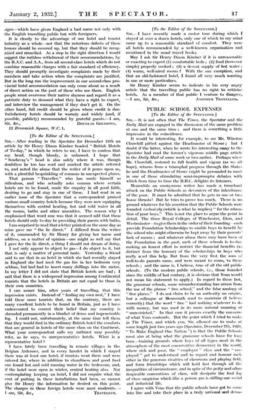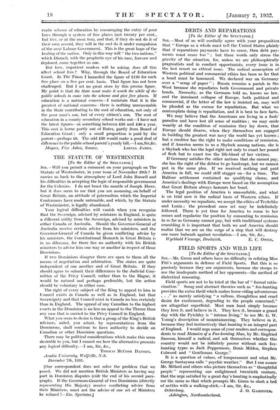PUBLIC SCHOOL EXPENSES -[To the Editor of the SPECTATOR.)
Sin, —It is not often that The Times, the .Spectator and the. Daily Mail are engaged in the discussion of the same problem at one and the same time ; and there is something a little impressive in the coincidence.
It would be interesting, for example, to see Mr. Winston Churchill pitted against the Headmaster of Stowe ; but I doubt if the latter, when he wrote his interesting essay to the Spectator had read the former's vigorous middle page article in the Daily Mail of some week or two earlier. Perhaps when Mr. Churchill, restored to full health and vigour (as we all hope), returns from a triumphal progress through the States he and the Headmaster of Stowe might be persuaded to meet in one of those stimulating semi-impromptu debates with which from time to time the B.B.C. delights its listeners.
Meanwhile an anonymous writer has made a trenchant attack on the Public Schools as devourers of the inheritance of the poor. It must be admitted that he gets in one or two home thrusts! But he tries to prove too much. There is no ground whatever for his assertion that the Public Schools were founded exclusively (which is what he implies) " for the educa- tion of poor boys." This is not the place to argue the point in detail. The three Royal Colleges of Winchester, Eton, and Westminster—to give them in the order of their founding—each provide Foundation Scholarships to enable boys to benefit lay the school who might otherwise be kept away by their parents' lack of means ; and whatever abuse there may have been of the Foundation in the past, each of these schools is to-day making an honest effort to restrict the- financial benefits (as distinct from the honour) of the scholarships to boys who really wed this help. But from the very first the sons of well-to-do parents came, and were meant to come, to these schools ; and the same is, I believe, true of all the old public schools. (To the modern public schools, i.e., those founded since the middle of last century, it is obvious that Vous would not mean his statement to apply.) In regard to these last, the grammar schools, some misunderstanding has arisen from the use of the phrase " free school," and the false analogy of " free places." I do not claim to be an authority on origins, but a colleague at Monmouth used to maintain (I believe correctly) that the word " free " had nothing whatever to do with money, but was used in its more natural meaning of " unrestricted." In that ease it proves exactly the COnvernt, of what Vous contends. But the point which I tried-to make in The Times, and which you, Sir, allowed MC to make at some length just two years ago (Spectator, December 7th, 1929, " To Make England One Nation ") is that the Public Schools must aim at being what the grammar schools have for long been—training grounds where boys of all types meet in the atmosphere of the most conservative democracy in the world, where rich and poor, the " employer " class and the " em- ployed " get to understand and to regard and honour each other in the generous rivalries of classroom and playing field, and form friendships which will hold fast through all the inequalities of circumstance, and in spite of the petty and often despicable conventions of class, will dissipate the foul fog of class suspicion which like a poison gas is stifling our social and industrial life.
I agree with Vous that the public schools have got to come into line and take their place in a truly national mud demo- cratic scheme of education by encouraging the entry of poor boys through a system of free places (not twenty per cent., but five, or at the most ten), and that, if they do not do it of their own accord, they will in the end do it under compulsion of the next Labour Government. This is the great hope of the healing of the nation. Only in this way will " the two nations," which Disraeli, with the prophetic eye of his race, foresaw and deplored, come together as one.
But how, impatient readers will be asking, does all this affect school fees ? Why, through the Board of Education Grant. In The Times I hazarded the figure of £120 for each free place on a five per cent. basis. That figure has not been challenged. But I set no great store by this precise figure. My point is that the State must make it worth the while of the .public schools to come into the scheme and give free places. If education is a national concern—I maintain that it is the greatest of national concerns—there is nothing unreasonable in the State contributing to the cost of education, not only of the poor man's son, but of every citizen's son. The cost of education in a county secondary school works out—I have not the latest figures—at something between £30 and SAO a year. This cost is borne partly out of Rates, partly from Board of Education Grant ; only a small proportion is paid by the parent—perhaps £6. The odd £30 would make a good deal of difference to the public school parent's yearly bill.—I am,Sir,&c.
Moyses, Five Ashes, Sussex. LIONEL JAMES.







































 Previous page
Previous page